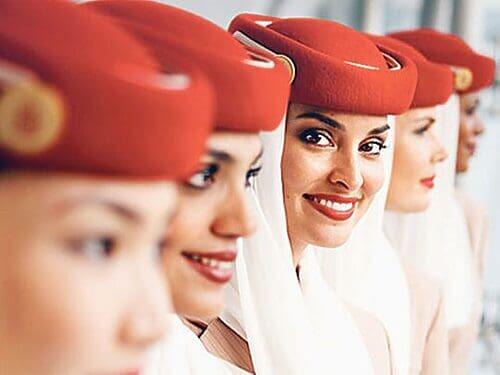Dubai’s flagship carrier Emirates and budget airline flydubai have confirmed their plans to hire hundreds of professionals for full-time roles in different capacities – locally and internationally.
Ghaith Al Ghaith, CEO at flydubai, told Gulf News: “This year, we have taken delivery of 20 new aircraft and have grown our network to 114 destinations. To support this growth, we have grown our workforce, attracting more than 1,300 new employees since the start of 2022, 80 per cent of whom are cabin crew, engineers and pilots. This is the biggest recruitment drive that we have ever undertaken.”
Al Ghaith added, “A recruitment drive to add more talented professionals to our workforce is currently underway and will continue throughout 2023.”
When asked about the employees who lost their jobs amid the pandemic, the CEO said flydubai retained most of their workforce and could quickly ramp up operations when governments lifted travel restrictions. “We introduced a voluntary leave scheme, and 97 per cent of those who opted for the scheme have since rejoined the workforce,” he stated.
Recruitment drives at Emirates
Emirates, too, has confirmed its plans to hire new talent. A spokesperson for the airline said, “We’re looking for talent in customer-facing roles, including cabin crew, pilots and airport services employees, and below-the-wing roles like skilled mechanics, technicians and planners, for above-the-wing roles that manage our resources at the airport, cargo and catering, and also for key roles in Engineering and IT, among others.”
Moreover, given the Dubai airline’s strategic expansion plans, Emirates is also looking for professionals in HR, finance, legal, marketing and executives across brands and departments.
Since 2022 has already seen a phenomenal rebound in travel, airlines and travel companies expect the trend to grow stronger in 2023. “At the Emirates Group, we anticipated this growth and started recruiting across many key roles and our brands at the end of 2021. Next year, we will continue to focus on recruitment and sourcing talent globally,” the company spokesperson added.
What salaries can job seekers expect?
Most airlines’ salary structures differ based on roles and seniority. “The starting salary for our cabin crew, as an example, is an average of Dh10,000, based on basic and flying pay, while the average salary for our first officers is around Dh31,000 based on basic and flying pay,” explained the Emirates spokesperson. The flagship airline also offers its employees a range of benefits, including eligibility for profit share, medical insurance, life insurance, concessional cargo and flight tickets.
In the case of travel agencies, depending on their years of experience staff can earn anything between Dh4,000 to Dh8,500. “A ticketing staff can expect anything between Dh4,000 to Dh5,000, and airport check-in staff can look to earn Dh3,500 to Dh4,000. Airline sales executives can earn Dh7,500 to Dh8,500 per month,” said Husain Iqbal, General Manager – GSA at Sharaf Travel.
Iqbal added: “Across the GSA (general sales agent) front, we have been hiring, but it is purely need-based. We have hired at multiple scopes, including reservation and ticketing, GSA sales and airport operations,” he added.
The strongest demand is for pilots
Maxmillian Buerger, managing director of market intelligence platform and advisory company AFM.aero, said 2023 is forecasted to be a strong year for airlines in the Middle East, with the demand for talent to support the recovery and subsequent growth of operations being tremendous. However, the most robust demand is going to be for pilots, said Buerger.
“In 2022, the 12 largest US airlines hired nearly 13,500 new pilots - this is the largest recruitment number on record. In India, which had days in December where the daily air travel passengers broke 2019 records, the country has issued more than 1,000 pilot licenses in the last year (also a record),” said Buerger.
In the UAE, airline pilot training academies such as Emirates Flight Training Academy graduated their largest cohort with 53 new pilots. “Even new international pilot training groups setting up operations, such as AeroGuard Arabia in Saudi Arabia, all indicate a build-up to meet the demand for pilots in the coming years,” explained Buerger.
In its 2022-2041 Global Service Forecast, Airbus shares that airlines will require 585,000 new pilots globally, which translates into 80 new pilots per day. To train a new pilot ready to fly, an airline will take a minimum of one-and-a-half to two years and requires enough pilot training infrastructure and instructors to be available. “The Middle East region has been focusing on enhancing its pilot training infrastructure, and flight schools continued operating throughout the pandemic as they knew the demand following the pandemic would be significant,” he said.
Average salaries for aviation professionals
• Aeronautical Engineer: Dh21,600
• Aerospace Engineer: Dh26,200
• Aerospace Technician: Dh19,900
• Air Crew Officer: Dh13,300
• Air Traffic Assistant: Dh10,900
• Airline copilot: Dh22,800
• Aviation analyst: Dh22,800
• Cabin crew: Dh10,000 (starting salary)
What skill sets must young aviation professionals have?
Each role requires specific technical, creative or other complex skills. Here are some critical soft skills Emirates looks for in its employees:
• Communication and collaboration
• Ability to access and analyse information (data analytics)
• Digital literacy
• Curiosity and a love for learning
• Emotional intelligence
• Self-awareness
Read More















